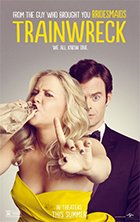Trainwreck
|  Trainwreck, the writing and starring debut of comedienne Amy Schumer, is a nice, redemptive romantic comedy with a lot of F-bombs in it, which by Hollywood standards makes it pretty much routine. It’s not exactly the kind of movie you’d want to take your sweet grandmother to, but at the same time, it’s hardly the kind of the comedic subversion that viewers have come to expect from Schumer, whose self-titled Comedy Central program has featured sketches about military rape and Bill Cosby. For her Hollywood debut, Schumer hasn’t entirely toned down her bad-girl raunch, but she has encased it within a very safe, comfortable, and familiar narrative arc about love and redemption, which shouldn’t be too surprising given that the film was directed by Judd Apatow (Knocked Up, This Is 40). Trainwreck, the writing and starring debut of comedienne Amy Schumer, is a nice, redemptive romantic comedy with a lot of F-bombs in it, which by Hollywood standards makes it pretty much routine. It’s not exactly the kind of movie you’d want to take your sweet grandmother to, but at the same time, it’s hardly the kind of the comedic subversion that viewers have come to expect from Schumer, whose self-titled Comedy Central program has featured sketches about military rape and Bill Cosby. For her Hollywood debut, Schumer hasn’t entirely toned down her bad-girl raunch, but she has encased it within a very safe, comfortable, and familiar narrative arc about love and redemption, which shouldn’t be too surprising given that the film was directed by Judd Apatow (Knocked Up, This Is 40).Schumer plays Amy Townsend, a character who will look very familiar to those who have watched her stand-up comedy. She is, in effect, Schumer’s stand-up persona as a movie protagonist. As she self-described in one of her stand-up acts, Schumer looks decidedly Midwestern with her soft face and small mouth—as if she milked something recently—which is disarming because she appears at first unthreatening even though it is later revealed that her character’s self-centeredness could easily be taken for casual cruelty. Amy is the trainwreck of the title, although that term is arguably exaggerated. She is, after all, a successful writer who manages to hold down a job writing for a skeevy men’s magazine that publishes articles about how to masturbate at work, and she is up for a promotion to associate editor. Amy was indoctrinated early on by her comically embittered father Gordon (Colin Quinn) that monogamy is simply not realistic, so she makes no efforts at maintaining any kind of real romantic relationships, instead indulging in night after night of intoxicated one-night stands that fulfill her momentary physical needs and little else (the very first scene shows her getting what she wants from a guy and then feigning sleep to avoid the quid-pro-quo). She drinks too much and she smokes too much pot, but it’s not enough to derail her career or put her out on the streets like the homeless man she talks to each morning on the way to work. If Amy is indeed a trainwreck, it is only in comparison to her younger sister, Kim (Brie Larson), who did not take their father’s anti-monogamy lessons to heart and has instead rebelled by marrying a sweet goofball, raising a stepson, and getting pregnant. Amy mercilessly mocks Kim’s settled suburban bliss, but we recognize long before she articulates it directly that her skewering derives primarily from her unacknowledged fear that she is not capable of living such a life. Enter Dr. Aaron Conners (Bill Hader), a sweet-natured, utterly genuine orthopedic surgeon on whom Amy is assigned to write a story by her callous editor Dianna (Tilda Swinton, virtually unrecognizable in bronzed make-up, heavy eye-liner, and a blonde wig). Aaron works primarily on star athletes, hence any interest in him as the subject of a magazine story, and he counts among his friends LeBron James, who plays a sincere, comically penny-pinching version of himself that works much, much better than most star athletes pretending to be actors (anybody remember Mike Ditka in Kicking and Screaming? John McEnroe in Mr. Deeds? Bret Favre in There’s Something About Mary?). Unfortunately, though, there’s a later scene that involves Chris Evert, Marv Albert, and Matthew Broderick playing themselves with such awkward self-consciousness that it should have been left on the cutting room floor, even if it was necessary for the plot. Amy finds herself drawn to Aaron, perhaps because he is the opposite of all the shallow men she’s been bedding most of her adult life. Having just recently broken up with Steven (John Cena), a muscle-bound gym rat who genuinely wanted a future with her, Amy is at a crossroads of sorts, and she decides to give in to the weird sense of love she’s feeling for Aaron. Will they make it? Will Amy be able to shed her old ways? Will she temporarily harden in misguided self-protection and drive him away only to realize that she’s made a horrible mistake? If you’re asking any of these questions, you haven’t watched many romantic comedies lately—or you’re expecting Schmer and Apatow to have somehow upended the genre, which they most decidedly do not. This, of course, makes Trainwreck sound incredibly prosaic, if not mind-numbingly formulaic, but it’s not—not entirely, at least. Schumer has certainly used a familiar structure in her screenplay, but the film works because she fills it with her unique brand of insight and humor. She infuses the film with her own perspective, most overtly via voice-over narration in which her character explains her motives and justifies her bad behavior, which unfortunately tends to come at the expense of the perspectives of those around her. There is some attention paid to the emotional world of Kim, although she exists largely as a narrative counterpoint to Amy’s guileless hedonism. Aaron, on the other hand, is more of a dream figure than anything: a nice, sensitive, funny surgeon who counts LeBron James among his best friends and dedicates time to Doctors Without Borders. He is, unfortunately, a doctor without a flaw, which makes him less interesting than he should be (he is very much kin to Chris O’Dowd’s Officer Rhodes in the Apatow-produced Bridesmaids, but at least he was a working-class immigrant cop, rather than a wealthy WASP surgeon). Schumer’s point is not just that girls can behave just as badly as men, but that such behavior carries with it a particular sting that is entirely a cultural attitude, which may be why the film is immediately defensive about it. When Amy dumps Steven, it has a comical edge because this enormous hulk of a man is basically sent away weeping by a seemingly innocuous blonde girl in high heels who wants to have her cake and eat it, too. She’s so inured by her promiscuity that she doesn’t even recognize her capacity to inflict emotional injury; she’s prejudiced into thinking that all men are boors like her father. It’s hard to get a read, then, on Schumer’s view of men, because they come in two diametrically opposed flavors here: boorish sexual conquerors (her father, her string of shallow one-night stands) and sensitive romantics (Steven, Aaron, LeBron James—yes, LeBron James). It’s like her own gendered twist on the Madonna/whore complex. Trainwreck suggests that a life without romantic connection is possible, but also that it’s empty—not just for Amy, but for anyone. After all, Gordon seems to exist for little reason but to remind us that Amy’s behavior is not some inborn trait, but rather something she has learned and can therefore unlearn (one might wonder how the film would be different in tone, if not ideology, had she had learned the anti-monogamy lesson from her mother, rather than from old-fashioned patriarchy). The fact that we see Gordon mostly as a randy, lonely old man suffering from multiple sclerosis in an assisted living facility is a none-too-subtle suggestion that the choice he made long ago to leave his wife and live free of romantic hang-ups and idealized monogamous relationships hasn’t done him much good (his most prized possession in life is his sports memorabilia and snow globe collection, which Amy wants to hang onto and Kim wants to throw out). It’s all about choice, and that is ultimately where Trainwreck reveals its conservative bona fides. If Schumer had really wanted to upend the system, we would have gotten a film in which an unrepentant hedonist is confronted with her behavior and choses to forge ahead, but instead we get one in which, following a favored hashtag of recent months, love wins. The latter wouldn’t necessarily be a better film, but it might have been a more honest one. Copyright ©2015 James Kendrick Thoughts? E-mail James Kendrick All images copyright © Universal Studios |
Overall Rating: 

 (2.5)
(2.5)


